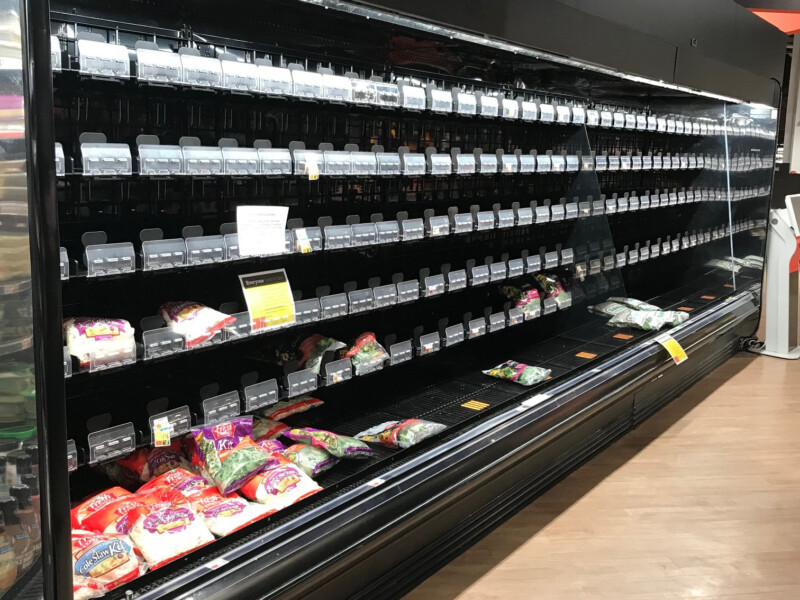
As the federal government shutdown marches through its third week, many regulated businesses are evaluating how they might navigate the closures in the short and the longer terms. Read on for some of the ways the government shutdown is affecting business in the food and beverage industry.
The FDA announced today that it will resume routine food safety inspections only for high risk domestic and imported foods and it will do so with hundreds of unpaid staff, according to FDA Commissioner Dr. Scott Gottlieb. They will start their work in the Northeast.
This is largely good news for food producers. While producers may have been grateful for a respite from surprise visits from FDA inspectors, the trade-off was the risk that consumers might lose confidence in certain foods. Recent food-related illness outbreaks and recalls, like the extended romaine lettuce recall, the Honey Smacks cereal and Goldfish cracker recalls, shell egg and shredded coconut recalls and even a recall involving one of Vermont’s most beloved companies (proof that it can happen to anyone), have increased consumers’ interest food facility inspections and their suspension. Having the FDA inspectors back on the job will help sustain consumers’ confidence in industry practices.
If your food is among those the FDA considers high risk, like soft cheese, for example, you should consider the FDA’s operations to be back to business as usual. If you’re not in that category, don’t drop your guard. The FDA’s focus won’t be pulled away forever. This may be the perfect opportunity to get your house in order if you need to. Pop over to my FDA warning letter trigger post to see what to look for first.
Expect delays in approvals for additives, food packaging, labels and other matters, including food facility registrations. If you missed the window at the end of 2018 to renew your food facility registration, your registration was canceled and you must start the registration process anew. You can access the online system, but don’t count on processing or assistance until the furloughed workers return. That goes for other processes that require pre-approval, permitting and other routine operations, as well. A call to the FDA Industry Systems confirms that it and the Federal Unified Registration and Listing System (FURLS) are closed. The lights are off and no one’s home.
The TTB has suspended operations. The Alcohol and Tobacco Tax and Trade Bureau (TTB) closed on December 26 and has not re-opened. The TTB website is still operable to date, so COLA submissions, formulas, permit applications and operational reports can be submitted, and certainly returns for federal excise taxes must still be submitted on time, but don’t expect any actions on submissions to take place before the Agency returns to work or, depending on the backlog, for some time afterward. Personnel are not available to provide questions or guidance.
For the alcoholic beverage industry, an extended shutdown could block the release of new products and seasonal offerings and prevent alcohol producers from seeking approval to sell across state lines or open new locations. This is no small matter. The TTB reviewed more than 192,000 new labels for alcoholic beverages in 2018. See here for TTB COLA stats.
Alcoholic beverage producers are advised to continue to make their submissions to secure their place in the queue and to ensure they don’t miss deadlines, but plan for processing delays.
The USDA continues to inspect meat and poultry processors, because the inspectors are currently working without pay, but USDA reports that farmers rely on to plan their crops may not be issued on time. Supply-and-demand estimates, grain stockpiles, winter-wheat seedlings, crop-export sales and many other research and forecasting reports may be delayed, which could have a reverberating effect on the supply chain. According to industry reports, farmers may scale back production, which could result in a shortfall in the availability of domestically-produced ingredients for domestically-produced foods, which will necessarily expand reliance by food producers on imported ingredients. The long-term effect is only speculative, but it could be wide-reaching.
FDA lab testing will be severely curtailed. The Agency laboratories are critical to arrest an outbreak when one is found. The labs are currently operating with a skeleton crew. Furloughed scientists have expressed serious concern about the safety of the food supply without full employment in the labs.
The Supplemental Nutrition Assistance Program (SNAP) is operating currently, but may not continue to deliver benefits if the shutdown extends past January. Loss of SNAP and School Lunch and School Breakfast benefits will affect not only the families that rely on them, but may also suddenly curtail institutional orders.
Trademark matters. As the United States Patent and Trademark Office (USPTO) operates largely on the revenue it takes in from fees and less on appropriations, it is so far still open for business. Even calls for assistance are answered and effective. Food and beverage producers can therefore secure their trade and service marks (unless it’s for a CBD or cannabis product, but that’s for a different post) even if they can’t get their labels approved until the shutdown ends.
Miscellaneous impacts. Food and beverage producers will be affected in a myriad of other matters common to other industries. E-Verify is currently closed, for example, making hiring new workers problematic. The Internal Revenue Service is limited as is the Environmental Protection Agency. As employers and manufacturers, food and beverage producers will stumble into additional obstacles that are not unique to the industry as they navigate the world without access to government.
It is worth noting that furloughed employees who work during the shutdown deserve gratitude for keeping the system running – at least on a few cylinders – for the benefit of producers as well as consumers. If they stay home, furloughed federal employees can collect unemployment. If an employee goes back to work, however, even if they are unpaid, they can no longer receive unemployment benefits, nor can they undertake temporary work to bridge the gap. It is a great deal to ask and to receive from our public servants.




